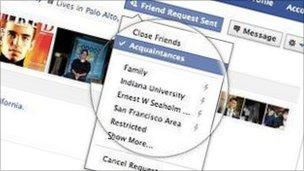Is Facebook losing its identity?
- Published
- comments

Facebook will help to suggest lists to users based on people's workplaces, school or similar
What's up with Facebook? Every day this week seems to bring a new announcement about some tweak to the way the network operates, and that's before next week's F8 event, where we expect to hear about a music service, possibly operated by Spotify.
This week's announcements are all about how you manage and control your public presence on Facebook.
First, "improved" friend lists, which as far as I understand will let us choose more carefully who gets to see what. This is how the company's blog sells it:
"Want to see posts from your closest friends? Or perhaps you'd like to share a personal story with your family - without also telling all your co-workers. With improved Friend Lists, you can easily see updates from and share with different lists of friends."
The promise is that Facebook will take the heavy lifting out of separating your contacts into separate groups by giving us smart lists, which will look at people who appear to share a workplace, a school or a family with you and suggest they go into a particular list.
The aim appears to be to rival Google+, the new social network that has acquired a degree of traction with techies, by offering greater control of how you share information.
The trouble with this for me, and I suspect many others, is that it makes the whole business of managing your social networking activity just a bit too tedious.
Strangers' status
Who has got the time to draw up lists - or Google+ circles - and then worry about who gets what each time you post something?
The other Facebook announcement, slipped out without much fanfare, appears to be aimed directly at Twitter.
It allows you to subscribe to the feed of anyone - celebrities, journalists, politicians - even if they are not your friends. It sounds like a privacy nightmare - but the people in question have to opt first to switch on the "allow subscribers" button.
All three party leaders already have a presence on Facebook and Twitter
It will be interesting to see whether celebrities race to acquire millions of subscribers, just as they compete for Twitter followers. But don't most people see Facebook as a more private place than Twitter, and won't they feel disinclined to use it to speak to the world rather than their friends?
Mark Zuckerberg has been on a long campaign to persuade Facebook users that more is better when it comes to sharing stuff online - he seems eager for us all to live our lives in public.
There also seems be a certain paranoia at the network's Palo Alto headquarters about the threat from competition, especially from Google.
As if to feed that paranoia, Google announced yesterday that all three leaders of the main UK political parties had signed up to Google+. You can see their profiles here: , , .
But judging by the reaction from other users, the politicians may decide that spending much time "engaging" via Google+ is not that worthwhile.
Here's one comment on David Cameron's page:
"Mr Cameron, 106 comments in 15 hours and they seem genuine - but none are asking relevant questions and some are offensive, so it is not a surprise that you have not responded."
The landscape of social networking , after a period of massive upheavals, seems to be settling down.
Facebook is the mass market network for personal use, Twitter is a news platform for public broadcasting of information and views, and Google+ is a niche forum for the geek community.
So Facebook should not really need to go through the repeated identity crises it seems to enjoy, as it tries to work out how to offer everything its rivals promise and more.
But, as a Silicon Valley sage once said, only the paranoid survive.